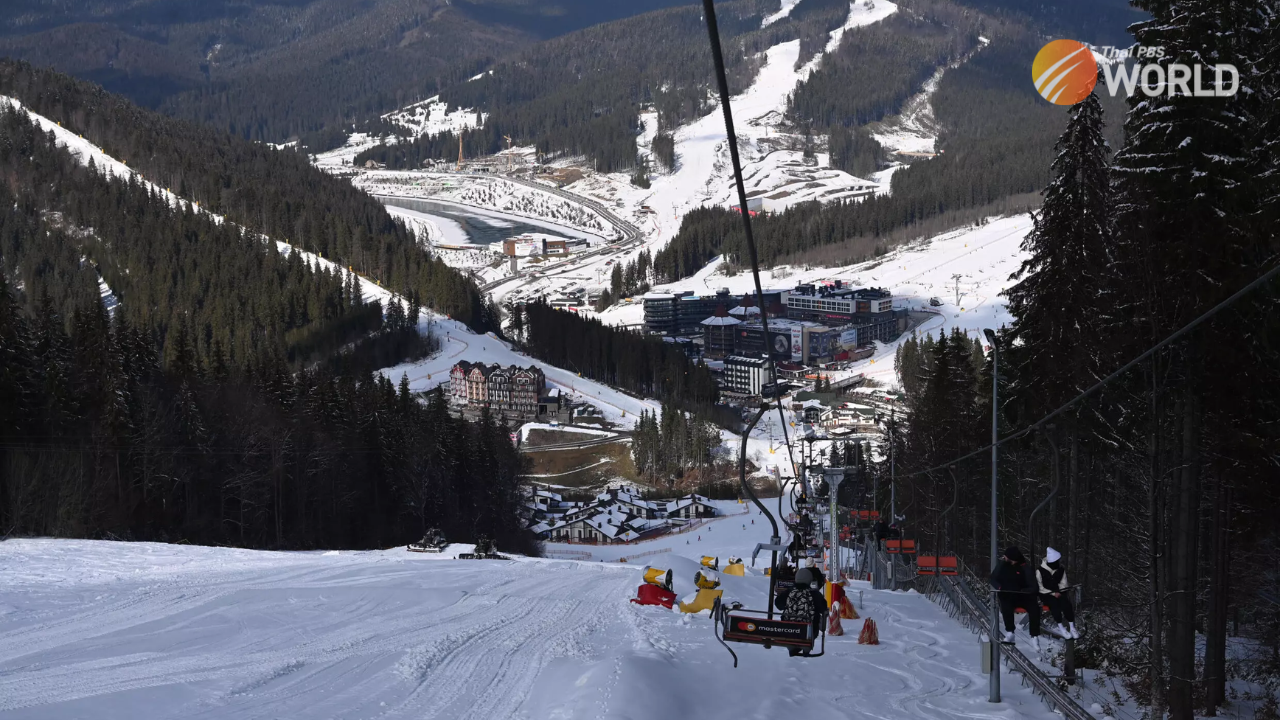
Now late in the season, the melting slopes are topped up daily by snow cannons run on generators © Attila KISBENEDEK / AFP
Far from the Ukraine war’s frontlines, only the whirring of generator-powered ski lifts disturbs the calm at Bukovel in the country’s west, a winter resort nestled in the pine-forested Carpathian Mountains.
For Liliya, an English interpreter from Ukraine’s Sumy region just 20 kilometres from the Russian border, who declined to give her surname for safety reasons, a first-time skiing holiday offered welcome if only brief respite.
“Here we try to forget about the war,” she told AFP while adjusting her eight-year-old daughter’s ski goggles.
“Although my mobile phone alerts me three or four times a day about sirens back home,” she said wearily.
Sprawling above the village of Polyanytsya, Bukovel boasts 75 kilometres of pistes and 17 lifts. Now late in the season, the melting slopes are topped up daily by snow cannons run on generators.
After Russia invaded, Liliya fled to Germany, but returned three months later to be near her soldier husband.
“We came here in late winter, because he could only get time off now,” as she pointed nervously toward her husband slaloming down a slope.
Svetlana Kocievska, another newcomer to skiing, watched her two children frolic beside the beginners’ slope, waiting for an instructor to arrive.
“For children the war is psychologically difficult. Studying online at home and not meeting other kids is bad for their eyes and their minds,” said the 33-year-old, a dentist from the central region of Vinnytsia.
“Kids love snowballs, and we have no snow in our town,” she said, adding that the trip was a gift from her children’s grandparents.
– ‘Very different vibe’ –
This year “the vibe is very different,” said ski instructor Bogdan Nakonechniy, a tall 26-year-old who has worked at Bukovel for three seasons.
Since the start of Russia’s invasion, most skiers are women and children — or men not of military age.
Many of the hotel developments dotted all over the hills lie unfinished. Only one in every four or five of the lifts heading upwards carried skiers.
“Less people have come this year but those that do are more emotional due to the war, they seem to appreciate it more,” Nakonechniy said after finishing the last of his four daily lessons.
At a refreshments kiosk Vladislav Fedchuk, a seasonal worker from Lviv, sold homemade cherry liqueur to thirsty visitors.
“They need bravery to go up on the lift,” laughed the goatee-bearded 22-year-old.
“Ukraine will win, and soon we can return to normal life,” he said, adding that one day he might also learn how to ski.
– Foreign tourists vanished –
For Taras Humenyuk, a worker at the Extreme Style Sports skiwear store, the hardest part of visiting Bukovel is returning home to more dangerous parts of Ukraine.
“The sirens sound here too sometimes, but people ignore them and the ski lifts don’t stop working,” the 22-year-old said.
“Ninety-nine percent of our customers are Ukrainian now. Before, 30 percent were foreign,” he added.
Just after the invasion, a Russian missile strike near the store’s central warehouse at Hostomel outside Kyiv destroyed most of the store’s stock of ski gear, jackets, boots and warm socks.
“We still struggle with supplies, foreign brands don’t send new equipment as they fear we cannot pay,” Humenyuk said.
In the mostly empty restaurant of Baza Smart Hotel, its manager Natalia Havrylenko, 48, estimated that Bukovel’s tourist trade had fallen 90 percent since the invasion.
When the Russian army targeted critical infrastructure across Ukraine last year, she converted the hotel lobby into a co-working space for small-businesses, equipping it with generators and a Starlink internet connection.
“The goal of the hotel became to help society” by offering a shared space “to be calm and work without interruption,” Havrylenko said.
“When Ukraine wins, we trust that the tourism business will flourish again,” she said.
By AFP
